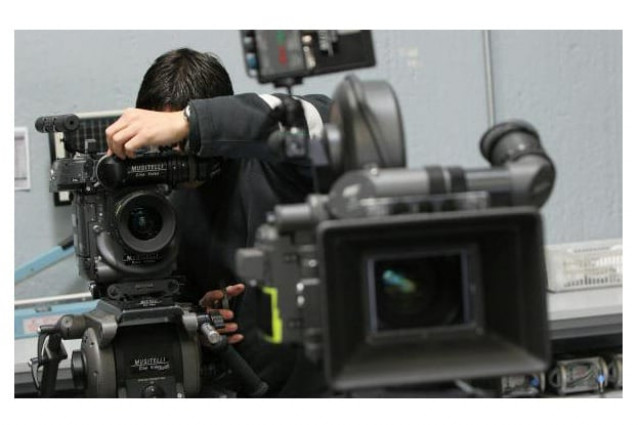Thesis show: Short films portray social, political themes
Graduating students of NCA’s Film and Television Dept present their work at show

PHOTO: AFP
“The death of the protagonist’s father has been inspired by what happened to a friend of mine. His father, a teacher, was murdered in Sindh for reporting a student,” said Raja Roy Diyach, talking about his film Wesaah. “Such incidents were rampant there at one time, but have now become less frequent,” said Diyach. “My film talks about moving on. I feel it is important,” he said. Talking about his future plans, Diyach said he first needed to create an original soundtrack for the film. “That is important to prevent copyright issues,” he said.

Firaaq was another film with a similar tone. The film shows a young man, Qamar, who has set out to seek revenge for his younger brother who has been put in jail for beating up the son of a powerful politician. Qamar pursues his mission without any thought for right and wrong.
When police kill his brother in jail, Qamar takes matters into his own hands. He avenges his brother’s death by killing Hashir. His parents are then left to deal with the death of two sons. As Qamar lies dying, he wishes for a chance to do things again. This time he would choose a different path.
Firaaq director Mahad Ali Sajid, said the film was a commentary on the reactionary nature of our people. He said he wanted to show how Qamar was wrong. “In a society, we seem to accept certain limits to our freedom and have learnt not to mess with people in power,” he said.
Sajid said that he would continue making films and wanted to focus on cinematography and editing.
Another interesting film at the show was Mein Chabbar or Chacha Abbu. Its director Baqir Mehdi said the film was about Chabbar village where he grew up.
“One of the reasons I was attracted to Chabbar was that I realised that there was something unresolved there,” he said. He said he had wanted to stay away from the subject of his own adoption, but his teachers had encouraged him to take it up. “They encouraged me to put myself out there,” said Mehdi.
“Earlier I had been visiting my village for a day or two, but this time I stayed there for two months,” said Mehdi. The film starts with Mehdi returning to his village and exploring various facets of life there. It tells how his biological parents, a hunchback and a mute, were married. “So they were considered a perfect match for each other,” he said.
After his mother died of an illness, Mehdi and his older brother were sent to live with their taya (father’s elder brother) who was married to their khala (mother’s sister). Growing up, the two brothers would refer to their biological father as uncle and their adopted father as father. The final act of the film shows the two brothers, Shahzeb and Baqir, talking to their biological father about why he agreed to the adoption.
Mehdi said he had been asked why he had chosen to showcase his personal life in the film. “I am happy with the result, but still there is some nervousness about exploring something so personal. I have not been to any of the screenings. I have also not shown the film to my family,” he said.
Published in The Express Tribune, January 21st, 2016.



















COMMENTS
Comments are moderated and generally will be posted if they are on-topic and not abusive.
For more information, please see our Comments FAQ